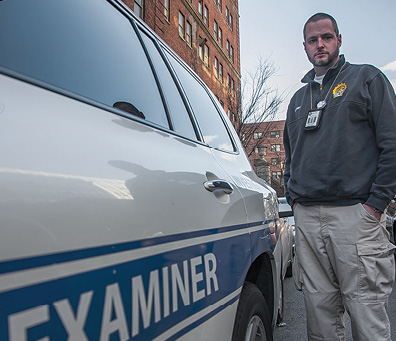Public Employee Press
BY DIANE S. WILLIAMS
Low pay causes medical examiner staffing crisis

The difference in annual salary is more than $16,500.
“This favorable decision underscores the extreme demands the city makes of its MLIs due to staffing shortages and retention issues that are made worse because the city doesn’t pay competitive salaries,” said Local 768 President Fitz Reid, referring to the ruling by the Office of Collective Bargaining, which regulates municipal labor disputes.
“The ME’s office is reluctant to hire and compensate these workers with wages that are comparable to what their peers in the private sector earn. This decision will force management to the table to negotiate an equitable remedy.”
These investigators have master’s degrees and at least two years’ experience in the medical field as Physicians Assistants or Registered Nurses. In the private sector, these positions are worth about 20 percent more than the investigators are earning as public employees. Union leaders said that gap leads to huge turnovers at OCME.
For every suspicious death in New York City, MLIs are required to examine the body, physical evidence and surroundings to help determine the cause.
Recent news stories about bodies temporarily stored in subway station breakrooms and the trauma inflicted on Transit workers who unexpectedly encountered bodies of people killed on train tracks serve to highlight the complexities long delays and staffing shortages impose on Local 768 MLIs.
Low pay has led to a 60 percent drop in the number of Medicolegal Investigators, Reid said. Their ranks fell to just 22 in a city of over 8.5 million. At one time OCME employed 50 investigators.
OCME’s recent closure of offices in the Bronx and Staten Island has created a “logistics nightmare… and led to hours of delays for families already coping with the emotional impact of the loss of loved ones,” Robert Ruggerio, executive director of the Metropolitan Funeral Directors Association, told The Chief-Leader newspaper.
Police are usually first on the scene when someone dies. City policy states they must wait with the body until the MLI completes an investigation and removes the body to the city morgue.
“The staff shortages at OCME lead to delays that cost taxpayers millions in overtime and pull Police Officers from their jobs of keeping New Yorkers safe,” Reid said. “Before this OCB decision, the agency imposed mandatory overtime and out-of-title work on MLIs.”
The union says new hires don’t stay long. Some leave after receiving OCME’s 12-week, highly valued training. Of the three MLIs hired in the last six months, all have left for better-paying jobs elsewhere.
“It’s time to hire more MLIs to reduce the overtime and mental and physical strain on our members who are doing their best,” Reid said. “The only way OCME can address its hiring and retention issues is to offer MLIs competitive salaries.”


